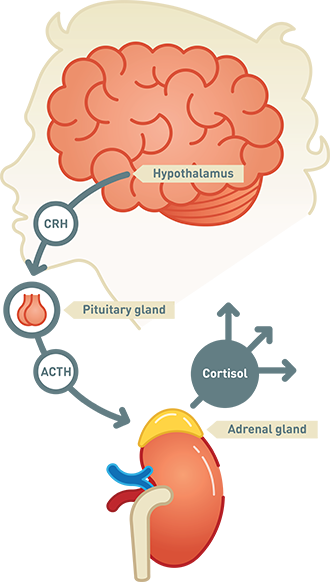
Metabolic Health | Adrenal Function
Metabolic Health Assessment
The Dutch Organic Acid Test (OAT) measures organic acids in urine to assess metabolic function, nutrient deficiencies, gut health, neurotransmitter levels, and more. By analyzing a unique combination of neurotransmitter metabolites, nutritional organic acids, oxidative stress markers, and melatonin levels through a simple urine sample, this test offers valuable insights to help healthcare providers and longevity coaches to develop personalized treatment strategies for their patients.
Who Should Take the Organic Acid Test
The OAT is beneficial for individuals experiencing a range of health issues, including:
1. Chronic fatigue or low energy: It can identify nutrient deficiencies and metabolic imbalances contributing to fatigue.
2. Digestive problems: Those with bloating, gas, constipation, or diarrhea can benefit, as the test assesses gut health and potential yeast or bacterial overgrowth.
3. Mood disorders: It's useful for individuals with anxiety, depression, or mood swings since it provides insights into neurotransmitter levels.
4. Behavioral issues or developmental delays: Children with autism, ADHD, or learning difficulties may benefit from understanding metabolic imbalances.
5. Frequent infections or immune issues: It can identify nutrient deficiencies affecting immune function.
6. Unexplained symptoms or chronic health conditions: The OAT provides a comprehensive overview that can help uncover hidden causes of persistent symptoms.
This test is ideal for those looking to address underlying imbalances and optimize overall health.
What Does The Test Examine
The Dutch Organic Acid Test evaluates an extensive panel of biomarkers, including:
Neurotransmitter Metabolites: The test measures levels of HVA (Homovanillic Acid) and VMA (Vanillylmandelic Acid), which provide insights into your brain chemistry and nervous system function. Imbalances in these neurotransmitter metabolites can be linked to conditions like depression, anxiety, and ADHD.
Nutritional Organic Acids: The test assesses four key nutritional organic acids - Kynurenic Acid, Quinolinic Acid, 3-Hydroxyisovaleric Acid, and MMA (Methylmalonic Acid). These markers can help identify potential vitamin and nutrient deficiencies, such as B vitamins, that may be impacting your overall health and well-being.
Oxidative Stress Markers: The test includes the measurement of 8-OHdG, a marker of oxidative stress. Elevated levels of oxidative stress have been associated with a wide range of chronic health conditions, including inflammatory diseases, autoimmune disorders, and cancer.
Melatonin: The test also evaluates your melatonin levels, providing insights into your circadian rhythms and sleep-wake cycles. Imbalances in melatonin production can contribute to sleep disturbances and other health concerns.
Benefits of the OAT
This comprehensive assessment can help identify the underlying causes behind a wide range of health concerns, including:
Hormonal Imbalances: Patients experiencing symptoms of hormonal disorders, such as irregular menstrual cycles, menopause-related issues, fatigue, mood swings, or unexplained weight changes, may benefit from the insights provided by the test.
Mental Health Concerns: Individuals experiencing depression, anxiety, mood disorders, or cognitive impairments might find the OAT useful in identifying biochemical imbalances that could be contributing to their mental and cognitive health issues.
Chronic Fatigue and Fibromyalgia: The test can be helpful for patients who suffer from chronic fatigue syndrome (CFS) or fibromyalgia by identifying nutritional deficiencies or metabolic imbalances that may be at the root of their condition.
Digestive Issues: Patients with unexplained digestive issues such as irritable bowel syndrome (IBS), chronic constipation, or diarrhea, might benefit from the test to explore potential nutritional deficiencies or imbalances contributing to their gastrointestinal symptoms.
Nutritional Deficiencies: Individuals with diets lacking in essential nutrients, or those with conditions that impair nutrient absorption such as celiac disease or Crohn's disease, are potential candidates for the test, as it can help identify specific deficiencies needing correction.
Sleep Disorders: For individuals experiencing sleep disturbances, insomnia, or abnormal sleep patterns, measuring melatonin levels can provide insights into disruptions in circadian rhythms and guide appropriate interventions.
Detoxification Issues: Patients concerned with or showing signs of poor detoxification, such as frequent exposures to toxins, persistent fatigue, or sensitivity to chemicals, might benefit from the insights into metabolic pathways provided by the OAT.
Preventive Health Measures: Individuals focused on preventive health and wellness who wish to optimize their metabolic, nutritional, and hormonal balance may also choose to undergo the DUTCH OATs test as part of a comprehensive health assessment.
How the Test Works
The OAT is simple and convenient. You'll collect urine samples over the course of two days, which are then shipped to the CLIA-certified and CAP-accredited Precision Analytical laboratory. Within 10 days, you'll receive a comprehensive report detailing your test results and insights to guide your next steps.
To learn more or schedule your test, please contact us today. Take the first step towards a deeper understanding of your body's inner workings and unlock the path to better health and wellness.
Adrenal Function Test
The Adrenal Function Test is a comprehensive laboratory panel designed to provide a detailed assessment of your adrenal gland health and function. These small but vital glands play a crucial role in your overall well-being, regulating your stress response, hormone production, energy levels, and immune function. However, chronic stress, poor lifestyle choices, and other factors can disrupt the delicate balance of adrenal function, leading to a range of concerning symptoms and health issues.
Who Should Take the Adrenal Function Test?
The Adrenal Function Test is recommended for individuals experiencing symptoms that may be related to adrenal dysfunction, such as:
Chronic stress and fatigue
Hormonal imbalances
Sleep disturbances
Mood disorders (e.g., anxiety, depression)
Difficulty managing stress
Unexplained weight changes
Additionally, athletes, active individuals, and those with chronic health conditions may benefit from this comprehensive assessment of adrenal function.
What the Adrenal Function Test Examines
The Adrenal Function Test by Doctors Data includes several key measurements to evaluate the performance of your adrenal glands:
Cortisol: Cortisol is the primary stress hormone produced by the adrenal glands. This test assesses your cortisol levels throughout the day to provide insights into your body's ability to regulate the stress response. Abnormal cortisol patterns can indicate conditions like adrenal fatigue or adrenal insufficiency.
DHEA-S: DHEA-S is another important hormone produced by the adrenal glands. This test measures your DHEA-S levels, which can offer information about overall adrenal function and hormonal balance. Imbalances in DHEA-S may be linked to conditions such as adrenal tumors, polycystic ovary syndrome, or Addison's disease.
17-OH Progesterone: The Adrenal Function Test also includes an assessment of 17-OH progesterone, a precursor hormone to cortisol. Elevated levels of 17-OH progesterone can point to adrenal dysfunction or hormonal disorders like congenital adrenal hyperplasia or adrenal gland tumors.
Cortisol to DHEA-S Ratio: By evaluating the ratio of cortisol to DHEA-S, this test provides insights into the functioning of the hypothalamic-pituitary-adrenal (HPA) axis, which is the body's central stress response system. This ratio can indicate your overall ability to manage and adapt to stress.
Benefits of the Adrenal Function Test
The Adrenal Function Test offers several key advantages:
Comprehensive Assessment: This panel provides a thorough evaluation of adrenal gland health and function, measuring multiple hormones and metabolites to offer a detailed picture of your body's stress response and hormonal balance.
Identification of Adrenal Dysfunction: By identifying imbalances or dysfunctions in the adrenal glands or the HPA axis, the test can help uncover the potential root causes of symptoms like chronic fatigue, sleep disturbances, mood disorders, and more.
Personalized Treatment Plans: The test results can guide your healthcare provider in developing targeted interventions to restore optimal adrenal function and address any underlying issues.
Monitoring Treatment Progress: The Adrenal Function Test can be used to track the effectiveness of treatments aimed at improving adrenal health, allowing your provider to make necessary adjustments to your care plan.
How the Test Works
The Adrenal Function Test is simple and convenient. You'll collect a series of saliva samples throughout the day, which are then shipped to the accredited laboratory. By measuring cortisol and DHEA-S levels at multiple time points, the test provides a complete picture of your diurnal cortisol rhythm and adrenal function.
Once your samples arrive at the lab, the doctors data team uses advanced analytical techniques to precisely measure the relevant biomarkers. This ensures accurate and reliable results that we will can use to develop a personalized treatment plan.
To learn more about the Adrenal Function Test or to schedule your assessment, please contact us today. Taking this important first step can unlock valuable insights about your adrenal health and guide you towards optimal wellness.
References
[1.] Brown MJ, Ameer MA, Daley SF, et al. Vitamin B6 Deficiency. [Updated 2023 Aug 8]. In: StatPearls [Internet]. Treasure Island (FL): StatPearls Publishing; 2024 Jan-. Available from: https://www.ncbi.nlm.nih.gov/books/NBK470579/
[2.] Cassani E, Barichella M, Cancello R, Cavanna F, Iorio L, Cereda E, Bolliri C, Zampella Maria P, Bianchi F, Cestaro B, Pezzoli G. Increased urinary indoxyl sulfate (indican): new insights into gut dysbiosis in Parkinson's disease. Parkinsonism Relat Disord. 2015 Apr;21(4):389-93. doi: 10.1016/j.parkreldis.2015.02.004. Epub 2015 Feb 13. PMID: 25707302.
[3.] Chen LM, Bao CH, Wu Y, Liang SH, Wang D, Wu LY, Huang Y, Liu HR, Wu HG. Tryptophan-kynurenine metabolism: a link between the gut and brain for depression in inflammatory bowel disease. J Neuroinflammation. 2021 Jun 14;18(1):135. doi: 10.1186/s12974-021-02175-2. PMID: 34127024; PMCID: PMC8204445.
[4.] Langan RC, Goodbred AJ. Vitamin B12 Deficiency: Recognition and Management. Am Fam Physician. 2017 Sep 15;96(6):384-389. PMID: 28925645.
[5.] Leong SC, Sirich TL. Indoxyl Sulfate-Review of Toxicity and Therapeutic Strategies. Toxins (Basel). 2016 Nov 30;8(12):358. doi: 10.3390/toxins8120358. PMID: 27916890; PMCID: PMC5198552.
[6.] Lugo-Huitrón R, Ugalde Muñiz P, Pineda B, Pedraza-Chaverrí J, Ríos C, Pérez-de la Cruz V. Quinolinic acid: an endogenous neurotoxin with multiple targets. Oxid Med Cell Longev. 2013;2013:104024. doi: 10.1155/2013/104024. Epub 2013 Sep 5. PMID: 24089628; PMCID: PMC3780648.
[7.] St Hilaire MA, Lockley SW. Measuring Urinary 6-Sulphatoxymelatonin in Humans. Methods Mol Biol. 2022;2550:21-28. doi: 10.1007/978-1-0716-2593-4_4. PMID: 36180673.
[8.] Turathum B, Gao EM, Yang F, Liu YB, Yang ZY, Liu CC, Xue YJ, Wu MH, Wang L, Grataitong K, Chian RC. Role of pyroglutamic acid in cumulus cells of women with polycystic ovary syndrome. J Assist Reprod Genet. 2022 Dec;39(12):2737-2746. doi: 10.1007/s10815-022-02647-1. Epub 2022 Nov 2. PMID: 36322230; PMCID: PMC9790836.
[9.] Wyant GA, Yu W, Doulamis IP, Nomoto RS, Saeed MY, Duignan T, McCully JD, Kaelin WG Jr. Mitochondrial remodeling and ischemic protection by G protein-coupled receptor 35 agonists. Science. 2022 Aug 5;377(6606):621-629. doi: 10.1126/science.abm1638. Epub 2022 Aug 4. PMID: 35926043; PMCID: PMC9639781.
[10.] Zhen D, Liu J, Zhang XD, Song Z. Kynurenic Acid Acts as a Signaling Molecule Regulating Energy Expenditure and Is Closely Associated With Metabolic Diseases. Front Endocrinol (Lausanne). 2022 Feb 24;13:847611. doi: 10.3389/fendo.2022.847611. PMID: 35282457; PMCID: PMC8908966.


